
Guests
- Elizabeth Goiteinco-director of the Liberty and National Security Program at the Brennan Center for Justice.
President Donald Trump has vowed to go to the Supreme Court to keep his tariffs in place after a whirlwind 24 hours that saw a court temporarily reinstate the measures, soon after two courts blocked most of the tariffs, saying Trump overstepped his presidential authority. Trump has been infuriated by the legal challenges and lashed out on social media against the Federalist Society and conservative legal activist Leonard Leo. We get an update from Elizabeth Goitein, co-director of the Liberty and National Security Program at the Brennan Center for Justice and an expert on the International Emergency Economic Powers Act that Trump has invoked to justify his global tariffs. She says the fate of Trump’s tariffs remain uncertain, given that the powers available under the IEEPA “have to be used to deal with an unusual and extraordinary threat to the national security, foreign policy or economy of the United States, and they cannot be used for any other reason.”
Transcript
AMY GOODMAN: This is Democracy Now!, democracynow.org. I’m Amy Goodman.
We turn now to Trump’s sweeping global tariffs, after a whirlwind 24 hours that saw a federal appeals court Thursday temporarily reinstate the tariffs just a day after the U.S. Court of International Trade blocked most of the tariffs, arguing Trump overstepped his presidential authority by invoking emergency powers. Prior to Thursday’s appeals court order reinstating for a few minutes these tariffs, a federal court in Washington, D.C., also blocked Trump’s tariffs, though that ruling won’t go into effect for another two weeks. The Trump administration has vowed to bring the legal fight to the U.S. Supreme Court.
In its ruling, the New York-based Court of International Trade said the U.S. Constitution gave Congress exclusive powers to regulate trade with other nations, and that a 1977 law cited by Trump to invoke the tariffs, the International Emergency Economic Powers Act, did not give him the authority to levy the sweeping import taxes.
President Trump denounced the attempts by the courts to block his tariffs in a lengthy Truth Social rant Thursday night that also targeted Leonard Leo, who, as a top member of the conservative Federalist Society, played a vital role in influencing Trump’s judicial picks during his first term, including the selection of three far-right Supreme Court justices. Trump wrote, quote, “Hopefully, the Supreme Court will reverse this horrible, Country threatening decision, QUICKLY and DECISIVELY. Backroom 'hustlers' must not be allowed to destroy our Nation! I was new,” Trump went on to say, “to Washington, and it was suggested that I use The Federalist Society as a recommending source on Judges. I did so, openly and freely, but then realized that they were under the thumb of a real 'sleazebag' named Leonard Leo, a bad person who, in his own way, probably hates America, and obviously has his own separate ambitions.” Trump went on to say, “I am so disappointed in The Federalist Society because of the bad advice they gave me on numerous Judicial Nominations. This is something that cannot be forgotten!” Trump wrote on social media, on Truth Social.
For more, we go to Washington, D.C., where we’re joined by Elizabeth Goitein, co-director of the Liberty and National Security Program at the Brennan Center for Justice, expert on the International Emergency Economic Powers Act, the law Trump has invoked to justify his global tariffs.
Welcome back to Democracy Now!, Elizabeth. OK, if you can respond to everything? First, explain what this court is that overturned the tariffs, said, “You can’t use this law,” and then even who Leonard Leo and the Federalist Society, who many may be shocked that Trump has turned on, given he helped choose three of the Trump appointees who were confirmed to the Supreme Court.
ELIZABETH GOITEIN: Sure. So, there are actually two courts that have now rejected Trump’s attempt to use emergency powers to essentially bypass Congress and impose worldwide tariffs. One of those courts is a regular federal district court here in Washington, D.C., and another court is called the Court of International Trade, which is a specialized federal court that hears challenges to laws involving trade or customs. The Court of International Trade heard the case with a three-judge panel, so we now have had four different judges, two of whom were appointed by Republican presidents, including one Trump appointee, and two of whom were appointed by a Democratic president. And all of them — so the Court of International Trade panel was unanimous — held that Trump exceeded the authority provided to him under law by imposing these tariffs.
AMY GOODMAN: And so, go more deeply into this 1977 law and what it means to invoke an emergency.
ELIZABETH GOITEIN: Sure. The law is called the International Emergency Economic Powers Act, or IEEPA, and it is one of the 150 laws that become available when the president declares a national emergency. IEEPA requires the president not only to declare a national emergency, but also the powers that are available under IEEPA have to be used to deal with an unusual and extraordinary threat to the national security, foreign policy or economy of the United States, and they cannot be used for any other reason.
IEEPA has historically been used to impose economic sanctions against hostile foreign actors. It forms the basis for dozens of existing sanctions regimes, including our sanctions against Iran, North Korea, Venezuela, etc. But it has never previously been used to impose tariffs. And that is because, while IEEPA includes a long list of powers that the president can exercise, that list does not include the words “tariffs,” “taxes” or “duties.” So, the government is instead arguing that language in IEEPA that allows the president to regulate economic transactions, including imports and exports, should be read to sort of impliedly authorize tariffs against every country in the world. And that’s —
AMY GOODMAN: Let me ask —
ELIZABETH GOITEIN: That is what the courts rejected.
AMY GOODMAN: The three-judge panel of the trade court also blocked a separate set of tariffs against China, Mexico and Canada, which the Trump administration had imposed over what it claimed was a flow of illicit drugs and undocumented immigrants into the United States.
ELIZABETH GOITEIN: Right. And there was actually a separate reasoning for blocking those tariffs. So, when it came to the worldwide tariffs, essentially, what the court said is that the government was claiming unlimited power to impose whatever tariffs that the president thought would be appropriate, and that that was such a massive sort of takeover of the powers that the Constitution gives to Congress. So, Congress, under Article I, has the authority — in fact, it’s the first power listed under Congress’s powers — to impose tariffs. And if you read IEEPA to allow the president to make up his own mind about what tariffs should be imposed on what countries, that would be unconstitutionally transferring Congress’s power to the president.
The fentanyl tariffs that you mentioned, against China, Mexico and Canada, were more limited, and so there was a different argument that was made in that case. What the plaintiffs argued was that under IEEPA, the powers have to be exercised to deal with an unusual or extraordinary threat and that the tariffs in this case were such a total mismatch to the threat that had been identified, the threats of fentanyl trafficking and human trafficking and illegal immigration, that it just didn’t meet the criteria for IEEPA. Now, in —
AMY GOODMAN: So —
ELIZABETH GOITEIN: — this case —
AMY GOODMAN: I’m going to interrupt — go ahead. Go ahead.
ELIZABETH GOITEIN: OK. Well, this is really important, which is why I’m not letting you interrupt me yet. What the government argued in this case was that no court can question the president’s decision that his actions under IEEPA are dealing with an unusual and extraordinary threat. And the Court of International Trade rejected this claim entirely. The court said that these criteria in the statute are clear and that the courts are capable of interpreting and applying them, and that the supremacy of the law requires that courts must be able to intervene when a president acts outside of the law. So, that was a very important part of the ruling that will have salience far beyond this immediate case.
AMY GOODMAN: So, you have Trump officials calling this a “judicial coup.” They’re going to take it to the Supreme Court. What do you see happening?
ELIZABETH GOITEIN: Well, I think it might take a little while, because there are several other lawsuits pending across the country on the tariffs, and there will be decisions in the lower courts, and then they will go up to the appellate courts. The appellate courts will have their chance to rule. Yes, this is headed toward the Supreme Court in the next term for the Supreme Court.
And, you know, I don’t think anyone can predict exactly what will happen, but I will point out that one of the arguments that the — or, one of the reasons that the Court of International Trade gave for holding that IEEPA does not authorize tariffs was because such a reading of IEEPA would violate the major questions doctrine. And that is a doctrine that the Supreme Court has really embraced in these last few years. Under this doctrine, any executive branch action, executive branch actions that have major political or economic significance, must be clearly authorized by Congress. It has to be explicit. It cannot be a vague or ambiguous provision that is being interpreted to grant that power. That is certainly the case with the government’s interpretation of IEEPA. So, there’s a strong argument on a — based on a doctrine that the Supreme Court has very much endorsed.
AMY GOODMAN: And before the Supreme Court, could the tariffs be blocked again? We just have 20 seconds.
ELIZABETH GOITEIN: Yes, it is possible. It’s also possible — and, I would argue, probably likely — that the courts will continue to stay these decisions and allow the tariffs to go forward pending appeal. But I wouldn’t bet a lot of money on that. It’s very unpredictable.
AMY GOODMAN: Elizabeth Goitein, I want to thank you so much for being with us, co-director of Liberty and National Security Program at the Brennan Center for Justice.
Next up, Reagan attorney Bruce Fein on the slew of pardons Trump has issued this week. Back in 20 seconds.
[break]
AMY GOODMAN: “Wave of History” by Downtown Boys, performing in our Democracy Now! studio.

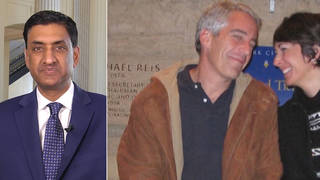
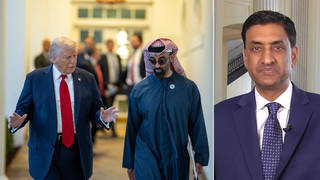
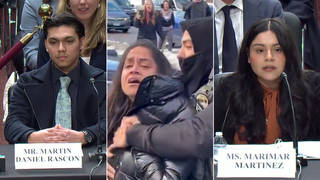
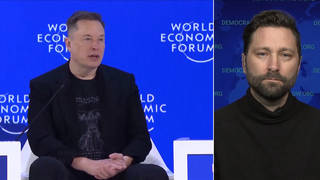







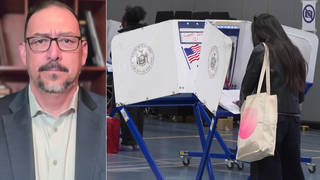
Media Options